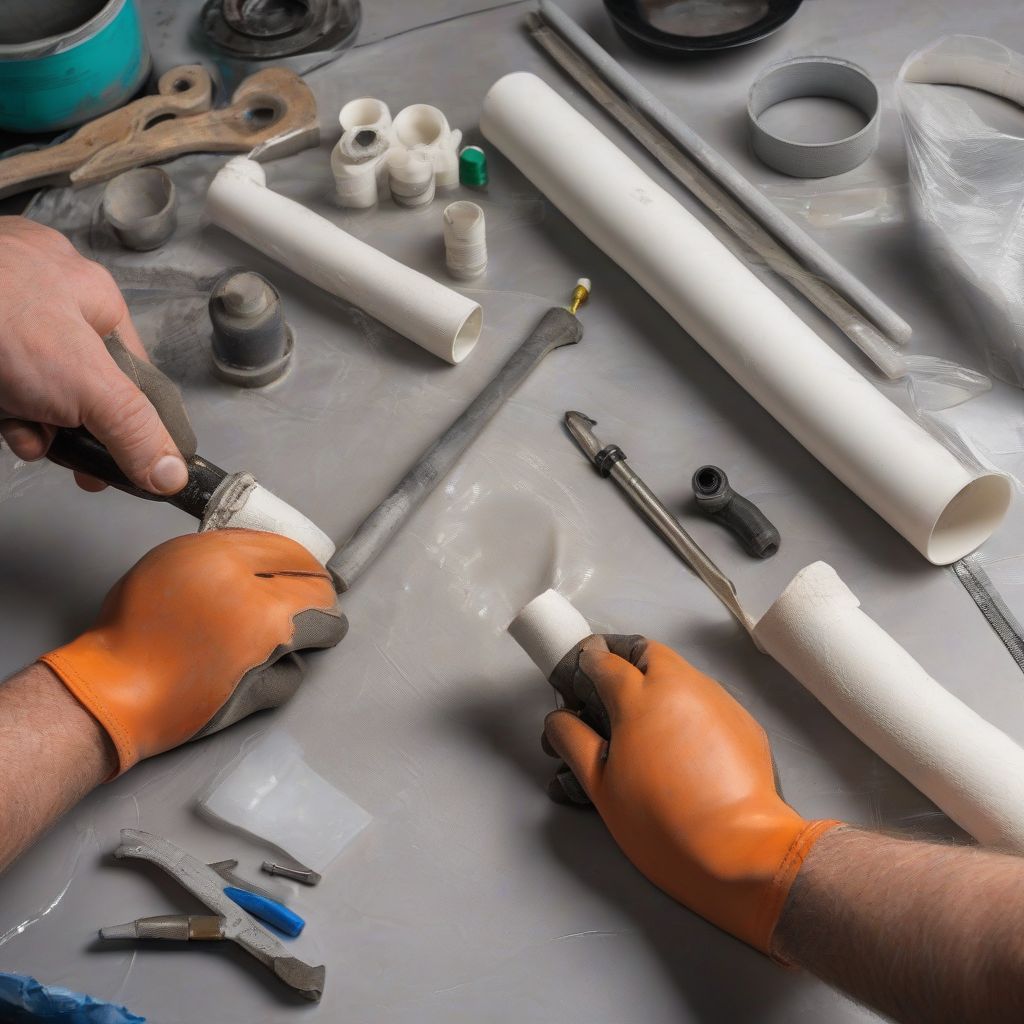A broken PVC pipe can spell disaster for any business, especially those dealing with large inventories and warehouse spaces. Whether you’re a seasoned distributor or a new supplier, understanding how to Fix A Broken Pvc Pipe quickly and efficiently is crucial. This guide will equip you with the knowledge to handle such plumbing emergencies, ensuring minimal disruption to your operations and bottom line.
Why Addressing a Broken PVC Pipe Matters for Your Business
In the world of logistics and supply chains, time is money. A broken PVC pipe can lead to:
- Water damage: Leading to costly repairs, damaged inventory, and potential mold growth.
- Operational downtime: Delays in shipping, receiving, or production can significantly impact your business’s profitability.
- Health hazards: Standing water can create a breeding ground for bacteria and pose risks to employee health.
Knowing how to fix a broken PVC pipe empowers you to address the issue swiftly, minimizing downtime and safeguarding your business’s valuable assets.
Common Causes of Broken PVC Pipes and How to Fix Them
Let’s delve into some frequently asked questions about broken PVC pipes and how to address them:
What are the most common reasons for PVC pipes to break?
PVC pipes, although durable, can break due to:
- Freezing temperatures: Water expands when frozen, putting immense pressure on the pipes.
- Impact damage: Accidental hits or improper handling during installation.
- Age and deterioration: Over time, PVC pipes can become brittle and prone to cracking.
- Root intrusion: Tree roots can grow into and around pipes, causing damage.
How can I temporarily Fix A Broken Pvc Pipe until a plumber arrives?
- Turn off the water supply: Locate the main water shut-off valve for your building or the affected area.
- Contain the leak: Use a bucket, rags, or tape to temporarily stop or slow down the leak.
- Contact a qualified plumber: For a permanent fix, it’s always recommended to consult a professional plumber.
innerpiecesonline.com/wp-content/uploads/2024/08/broken-pvc-pipe-repair-66c5a1.jpg" alt="Repairing a Broken PVC Pipe" width="1024" height="1024">Repairing a Broken PVC Pipe
Different Repair Methods for a Broken PVC Pipe
Depending on the severity and location of the break, you can choose from several repair methods:
1. PVC Pipe Repair Coupling
- Ideal for: Straight, clean breaks in the middle of a pipe section.
- Process: Cut out the damaged section, deburr the cut ends, apply PVC primer and cement, and secure the coupling over the break.
2. PVC Pipe Repair Tape
- Ideal for: Small cracks, pinhole leaks, and temporary fixes.
- Process: Clean and dry the area around the leak, wrap the tape tightly around the pipe, overlapping each layer.
3. Pipe Clamp
- Ideal for: Larger cracks or breaks where a complete pipe section replacement is not feasible.
- Process: Position the clamp over the break and tighten the bolts to create a seal.
4. Complete Pipe Section Replacement
- Ideal for: Extensive damage or multiple breaks in a single pipe section.
- Process: This method involves cutting out the damaged section and replacing it with a new piece of PVC pipe using couplings.
Proactive Measures: Preventing Future PVC Pipe Problems
Prevention is key to avoiding costly repairs and disruptions:
- Winterize your pipes: Insulate exposed pipes and allow a slow drip during freezing temperatures.
- Regular inspections: Schedule routine plumbing checks to identify potential issues early on.
- Choose quality materials: Invest in high-quality PVC pipes and fittings from reputable suppliers.
- Proper installation: Ensure proper installation by qualified professionals to prevent future problems.
Conclusion
A broken PVC pipe can be a major inconvenience, but with the right knowledge and preparedness, you can minimize downtime and protect your business. By understanding the causes, repair methods, and preventative measures, you can ensure smooth operations and safeguard your bottom line. Remember, while this guide provides valuable information, consulting a licensed plumber is always recommended for permanent repairs and to address complex plumbing issues.

